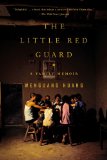Summary | Excerpt | Reviews | Beyond the Book | Readalikes | Genres & Themes | Author Bio

A Family Memoir
by Wenguang Huang
At the time, the Cultural Revolution, though winding down,
had not yet run its course. Chairman Mao's political campaigns
in the early 1970s included condemnation of Confucius and
the eradication of old traditions and rituals. Funerals and weddings
were simplified to reflect these views. Father said he had
attended a public denunciation against a company official who
gave his son a traditional wedding ceremony. Someone from the
village with a grudge against the official tipped off the authorities
that he had hired a red sedan chair to carry the bride and paid
a band to play traditional operatic tunes. The official's denunciation
was severe. Walls were plastered with big white posters
painted with black characters: transform old traditions
and customs! live simply and oppose waste! Posters even
covered an outside wall of the communal lavatory in our residential complex.
For me, the thought of dumping Grandma's body into a furnace
was rather scary, but at school we were taught that the traditional
burial was a symbol of the decadent and cruel past of
the pre-Communist era. There was a popular picture book for
schoolchildren, A Silver Dollar, which told of a poor family in
Father's home province of Henan. During the famine of 1942,
the family sold the daughter to a wealthy landlord as a maid.
When his mother died, the landlord killed the girl by putting
mercury in her drink so that she could serve his mother in the
afterworld. At the funeral procession, pallbearers carried the girl
sitting on a seat in the lotus position, with a fake lamp in her
hands. The mercury preserved her peachy skin color, making
her look as if she were alive. The story horrified me, making me
believe traditional funerals to be abhorrent.
Superstition, I thought, was worthy of condemnation. At
school, I was the head of the "Little Red Guards." During the
annual singing contest, my classmates and I performed a song
called "Down with Confucius, Oppose Old Rituals." I even helped
put together a display on the school bulletin board that featured
a cartoon of a big "revolutionary" fist pounding on an old man
who was supposed to be Confucius. Grandma would hear nothing
of my political activities at school. She even said Confucius
was a saint. I was often vexed by her adherence to the old ways.
On most things, I could bring her around with Father's help, but
on burial, she was firm and resisted all of our attempts to dissuade
her.
A filial son, Father had always respected Grandma's wishes
and seldom argued with her in front of us. This was different. At
dinner, he talked for the sake of Grandma about how Communist
leaders Chairman Mao and Premier Zhou Enlai had embraced
the idea of cremation back in the 1950s. "If our great leaders
don't even ask for exceptions, what's so special about us?" After
attending a coworker's funeral at Sanzhao Crematorium, in the
southern part of the city, he told her, "It wasn't bad." The body
of the deceased was brought over; relatives, friends, and coworkers
gathered for a brief wake. Instead of the traditional sutra
chanting and wailing, sad yet upbeat Communist-style mourning
music played over a loudspeaker. Government or company
officials delivered eulogies; family members thanked the officials
and gave brief talks. After everyone bid good-bye, the body was
slid into a furnace and the ashes were gathered at the other end
and placed in a cinerary urn, which was taken to a big hall, like
a library. Important leaders were accorded a bigger memorial
service, and they didn't have to wait in line for the furnace, but
everyone went the same way. On Qingming, or Tomb-Sweeping
Day, relatives retrieved the urn and paid tribute to the deceased
in a big yard behind the crematorium.
Grandma was skeptical. Neighbors had told her how crematorium
workers never completely emptied out the furnaces after
each cremation. "When they scoop out handfuls of ashes from
inside the furnace, how would you know they're mine? You might
pay tribute to someone else's mother at Qingming." Grandma
ended the conversation by standing and clearing the table.
Mother couldn't bear to see her husband beaten so easily.
Reprinted by arrangement with Riverhead, a member of Penguin Group (USA) Inc., from The Little Red Guard: A Family Memoir by Wenguang Huang Copyright © 2012 by Wenguang Huang
Your guide toexceptional books
BookBrowse seeks out and recommends the best in contemporary fiction and nonfiction—books that not only engage and entertain but also deepen our understanding of ourselves and the world around us.